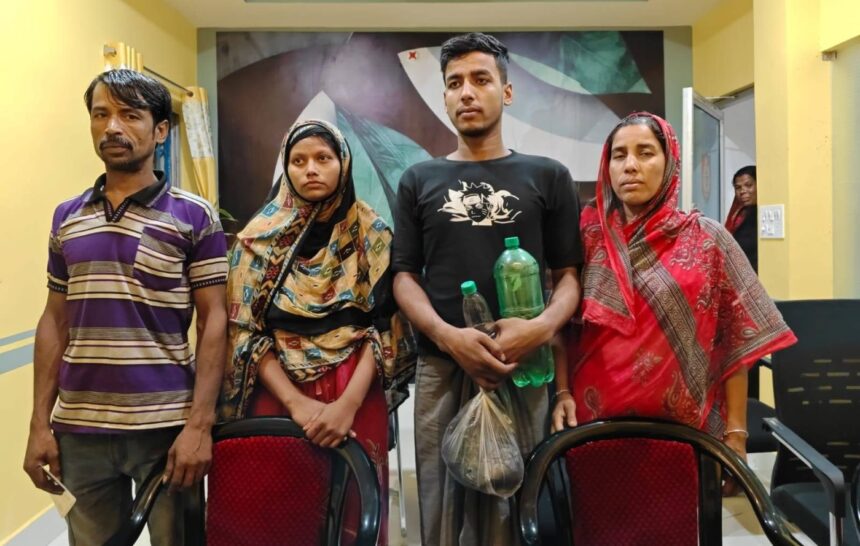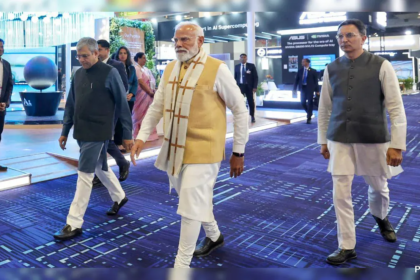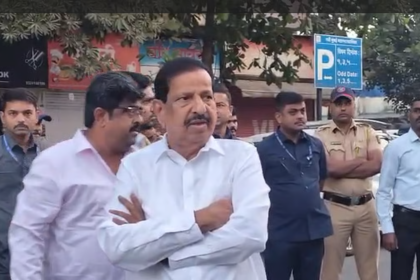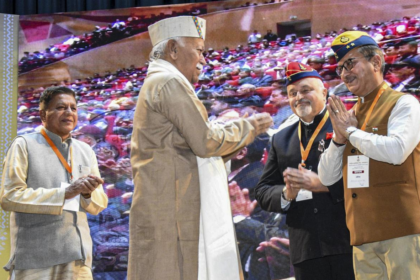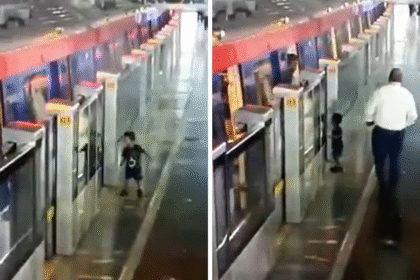Bengali Muslim Migrant Workers Pushed Back to Bangladesh Amid Rising Hostility in India
Hariharpara/Kolkata (Bengal): Nazimuddin Mondal can barely stand now. He winces as he tries to sit up at his home in Hariharpara of Bengal’s Murshidabad. His voice trembles slightly as he recounts his ordeal from early June.
“All I remember is that we were picked up by men from the Kanakia police station [in Mumbai] and then put on a flight to Agartala under tight security,” said Mondal. Thirty-four-year-old Mondal had been among the several from his village who had gone to Maharashtra to seek a livelihood.
Mondal says he was picked up by law enforcement from Mumbai on June 10, but that he lost track of dates after that. “It was a blur. I remember that couple from Bagda were on the same plane to Agartala in which I was and they were in tears,” he says. The Wire was later able to confirm their identities.

In Agartala, Mondal alleges that members of the Border Security Forces beat him and the others very badly. “I still haven’t recovered. My body aches. I feel pain standing up. My waist and legs hurt. They strip-searched us and beat us up. And then, one night, the BSF dumped us in Bangladesh,” Mondal says. He says that he was a part of a group of four men who were taken to a marshy land on the India-Bangladesh border and abandoned there.
The Border Guard Bangladesh (BDR) discovered them, Mondal says. “BDR officers shocked by our condition and the clarity with which we described our Indian homes,” he says. The BDR contacted the Mekhliganj Police Station in the Cooch Behar district in Bengal. Police then brought Mondal and the others back to India.
The news that four Indian men, including Mondal, were “returned” from Bangladesh made headlines across the country.
Mondal says he had furnished his Aadhaar card, PAN card, and Voter ID card to police in Mumbai, who allegedly confiscated all the documents. He also says that Rs 7,000 of his hard-earned wages were allegedly taken by BSF personnel. With no documents to show and no money to fund a trip back to Maharashtra, Mondal has not worked since.
Mondal is one among hundreds of Bengali-speaking workers, primarily from West Bengal, who are returning home broken – physically, financially, and psychologically – after being falsely branded “Bangladeshi infiltrators” by police in Maharashtra.
Bengal chief minister Mamata Banerjee will lead a rally tomorrow (July 16) against the stated harassment of Bengali-speaking migrant workers in BJP-ruled states, including Odisha, Delhi, Assam, Maharashtra and Jharkhand.
A similar story
Mehboob Sheikh, in his thirties, and from Bhagawangola which is close to Hariharpur, narrates a similar experience. Workers and the Trinamool Congress’s leaders allege that approximately 140 migrant workers from various Bengal districts were falsely labeled “Bangladeshis” and picked up from parts of Mumbai on June 9 and 10. “We used to live in Number 15. One day, the police picked us up. We showed our IDs. They said they were fake and that we were Bangladeshis,” Sheikh says.

A woman in Hariharpara whose son works in Mumbai. Photo: Joydeep Sarkar.
Several workers referred to the area in Mumbai’s Mira Road where migrants live as “Number 15”. The area falls under the Kanakia Police Station.
Sheikh describes being taken to a BSF camp and then being interrogated for four days in Pune. He, too, alleges that BSF personnel took everyone’s wallets, phones, Aadhaar and voter cards, cash, and even jewellery.
“They made us take off our belts. Our pants fell, and they laughed. We were humiliated. They took everything – money, phones, documents,” says Sheikh. He adds that women were similarly treated but did not give details of their mistreatment.
“We were flown to Bagdogra, herded into large vans covered with nets, and taken to another BSF camp. There, we were tortured again. We were served food and told, ‘Eat this, it’s your last Indian meal.’ At night, they drove us to a jungle-like area and said, ‘If you come this way again, we’ll shoot. Go back to your country,” Sheikh says.
The area where Sheikh describes he was taken does not have a visible fenced border. Workers describe it as a marshy wetland. It is considered no-man’s land.
After walking through forests and marshes, for roughly a week, Sheikh says that he and others in the group managed to crawl under a barbed-wire fence to re-enter India. Locals helped them reach the Raiganj police station, he says. Police there verified their identities, and they made their way back home.
Sheikh still gets nightmares. “We feel like we escaped death, but now we have nothing left,” he says.
A pattern of abuse
Since early June, a disturbing pattern of human rights abuses has emerged in the testimonies of Bengali-speaking migrant workers, especially from the minority community. Numerous people who have returned to Bengal describe having been arbitrarily arrested in Maharashtra, despite possessing valid Indian identification like Aadhaar and Voter IDs. Authorities all allegedly dismissed these documents as “fake,” branding the workers as Bangladeshis.

Shamim Khan. Photo: Joydeep Sarkar.
Shamim Khan was also picked up from Mira Road in Mumbai on June 10. Speaking from his house in Hariharpara, Khan says, “We were all arrested, flown to Bagdogra, and robbed of our money. I had Rs 20,300 – my whole savings. The BSF took it.”
Detainees reported facing torture at various BSF camps, including severe beatings, strip searches, and psychological torment.
Khan says, “We were beaten brutally. The BSF handed us Bangladeshi Tk 500 notes and took photos of us holding them. We kept insisting we were Indian Bengalis, but they just beat us more after hearing us speak Bengali.”
Trinamool Congress MP Samirul Islam, who heads the West Bengal Migrant Welfare Board, has been trying to set up a network among workers to help them.
“This is the first time I’ve seen something like this. To brand Indian citizens as foreigners and dump them in a foreign country shows a violent mindset. The situation is horrifying,” Islam says.
Islam says that he had also been contacted by several families of labourers in Rajasthan, originally belonging to the Itahar village of North Dinajpur district, who are now reported to be missing.
At a gathering at Tartipur village, in Hariharpara block, fear is palpable. Almost every household here relies on migrant labour, yet when the conversation turns to Mumbai, voices drop to hushed tones. Many who previously worked in the city now have no plans to return.
“I was spared because I was away that day [Jule 10]. But now, if you speak Bengali, wear a lungi, or cook fish and meat, you’re harassed. It wasn’t like this before. Now, speaking Bengali makes you look like a criminal. Our contractor even told us over the phone: ‘Speaking Bengali is dangerous. Learn Hindi, stop wearing lungis.’ But how can I change my mother tongue?” asks 41-year-old Anwar Ali, who has returned to his village fearing harassment. Ali is a distant relative of Nijamuddin Mondal’s.
What unfolded in Maharashtra is not an isolated case. In Odisha, Bengali migrant labourers have been beaten and branded “illegal Bangladeshi immigrants”. Street vendors in several towns report being robbed and harassed. A few months ago, Safiqul Islam, a painter from Kaliganj in Bengal’s Nadia district, was detained at the Jaipur railway station in Rajasthan for failing to produce his voter ID card. His family alleges that he remains in a detention facility to this day.
No clear count
Fajer and Taslima Mondal, a couple from Bagda in North 24 Parganas who were working in Mira Road in Mumbai, were detained on June 10 under suspicion of being Bangladeshi nationals. This is the couple that Mondal spoke of at the beginning of the piece. Before Fajer and Taslima’s phones were seized, they managed to alert relatives back home. Their family contacted the authorities in a panic. It is believed that this couple too was forcibly pushed across the Raiganj border into Bangladesh. After extensive coordination between Indian police and a BSF-BGB flag meeting, they were finally traced to a village called Bhatuli in Bangladesh and brought back on June 16.

Fajer and Taslima Mondal, the couple from Bagda. Photo: By arrangement.
“Why are Bengali speakers labelled as Bangladeshis? Why are we beaten for speaking our language or wearing lungis, or for the smell of fish curry?” asks another Hariharpara resident Sirajul Islam.
But many others haven’t been so fortunate. According to Asif Farooq of the Migrant Workers’ Unity Forum, there is no clear count of how many workers are still missing. Several names appear in official records, yet calls to their phones go unanswered. Silence is all that remains.
“Initially, only four cases of abuse were reported in the media. But now, the stories from returnees suggest the number is in the hundreds. None of their phones are working,” says Asif Farooq of the Migrant Workers’ Unity Forum who has filed an RTI on the scope of deportations.
Meanwhile, another family of three – Danish Sheikh (27), Sonali Bibi (25), and their son Sabir (5) from Dhitora village in Birbhum – has been missing from New Delhi since June 26. Sheikh and Bibi’s phones are switched off. According to workers who lived near them, the family was pushed back across the border on the claim that they are Bangladeshi.
Murarai village panchayat head Nitu Rabidas told said, “We know them. Their family was born and raised here. We have sent all the documents and proof to the Delhi Police, but have received no response.”


